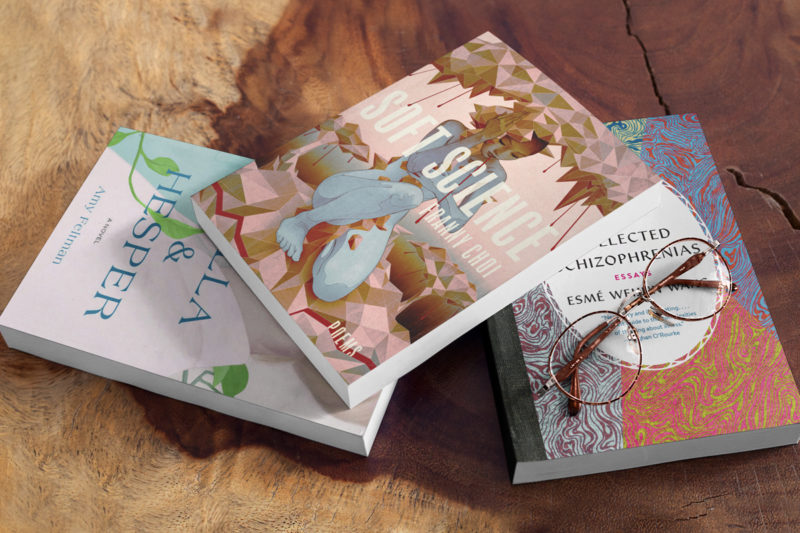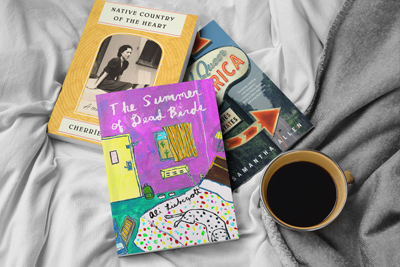Six Spring Books by Queer Women That Should Be On Your Reading List
Coming soon: a memoir by feminist icon Cherríe Moraga, a chatty road-trip novel about queer America, and meditations on mental health.

Publishing continues to be a very cis, very white, and very male industry.
But there’s no shortage of great writing by queer women. And, luckily, if you’re looking for some new books by queer women of varying identities, there are exciting titles across genres to choose from now and in coming months.
The Collected Schizophrenias: Essays by Esmé Weijun Wang (Graywolf Press)
First-person #OwnVoices mental illness narratives that don’t focus purely on depression are few and far between. It’s not that depression isn’t a serious and important illness, but the brain is the most complicated space in the universe, and there’s more to its health and illness than one disease.
With The Collected Schizophrenias, Esmé Weijun Wang brings the reader into a world of hallucination and divergence, of magic and fear. Her ambition and drive run up against the limitations of reality. The resulting story brings up questions of identity, access, empathy, and the nature of truth.
With a combination of deep research and detailed firsthand insight into experiencing psychosis, Wang’s gripping memoir immerses you in vivid hallucinations; she recounts how she “knew” things that weren’t true, such as being convinced she was dead. Her accounts of visiting doctors and a myriad of specialists shine a light on many facets of medicine, from the Western establishment to the more mystical nuances of supplemental alternative care.
Wang’s voice is like your smartest and most empathetic friend. This beautifully written work will expand your thinking about severe mental illness and mental illness in general, regardless of the diagnoses you do or don’t carry.
Willa & Hesper by Amy Feltman (Grand Central Publishing)
In Amy Feltman’s debut novel, protagonists Willa and Hesper meet in an MFA writing class at Columbia University. On the night they fall for each other, something traumatizing happens to Willa. The seven-month relationship that follows ends up being the fast-spinning merry-go-round that jump-starts the story; it flings both women onto their own separate but parallel paths. From Tbilisi to Berlin, New York City to San Francisco, each is on her own journey through family and cultural histories, evolving identity, and the turmoil of the 2016 presidential election.
A quirky ensemble of characters fills out the worlds around Willa and Hesper: Willa’s distant parents, her best friend Chloe, and the juvenile peers she meets on a trip for 20-something Jewish adults to visit Holocaust sites; Hesper’s parents with their on-again-off-again relationship, her clothes designer sister, and mysterious grandfather; and the MFA writing students who take themselves too seriously. The dialogue is reminiscent of Irish writer Sally Rooney’s—tight, witty, and very millennial.
As the two women separately investigate themselves and their family histories, they struggle with trauma and mental illness, both of which Feltman writes with nuance and authenticity. Balancing these two stories can make Willa & Hesper feel unwieldy at times. But its strength lies in centering queer women whose relationship with each other is not the end-all-be-all of their lives. The structure is refreshing and the characters complex, and it is a fast read despite its 304 pages. It is a great addition to the queer literary canon.

Real Queer America: LGBT Stories From Red States by Samantha Allen, (March 5, Little, Brown and Company)
The story of an endlessly endearing queer trans journalist who sets out on a road trip to prove that middle America is not just as queer, but queerer, than the coastal havens? Sign me up!
Samantha Allen is a GLAAD Media Award-winning writer with a PhD in women’s, gender, and sexuality studies. Her work appears in Rolling Stone, HuffPo, and the Daily Beast, where she’s on staff. She has serious writing chops, and with this reported memoir, she brings the reader on the ultimate queer road trip.
Real Queer America is a delight to read. Allen’s unique voice shines, transforming what could be a dry list of statistics and anecdotes into an engrossing journey full of humor, vulnerability, insight, and joy. Her voice is joined by those of her road brother Billy and everyone they meet along the way. What results is a beautiful tapestry of, well, the real queer America.
Allen also does an excellent job of blending interviews and research with her personal experiences to paint an eye-opening picture of what it’s really like to be queer in “red” states like Louisiana, Georgia, and Indiana. Through interviews and visits to queer community spaces, she makes a compelling case for the idea that the United States is incredibly queer, and that queerness is more potent, more inclusive, and even more important in the Southern and Midwestern oases she visits. Ultimately, it’s the sense of community and family among the Southerners she interviews that are the beating heart of the story. The red-state LGBTQ person who is proud not just of their identity, but of their home, is heard enough in the media, but they are found in these pages in droves.
Allen doesn’t brush off the very real discrimination and lack of rights faced by LGBTQ people in these states, especially those who are people of color. She includes a lot of discussion about these realities but makes the important point that places known for being queer-friendly are just as discriminatory.
Real Queer America is well-written and well-researched, and it’s a blast to read, but perhaps its most essential question is that of how complicit “blue state” LGBTQ people are in dismissing red states as scary places for queers. The whole world is scary, for queers and for everyone. Perhaps Real Queer America will inspire the reader to be more involved in fighting discrimination everywhere.
The Summer of Dead Birds by Ali Liebegott (March 12, Feminist Press)
Ali Liebegott is a pillar of queer poetry, and her new collection solidifies why. It’s a potent little meditation on grief. Gorgeous and raw, The Summer of Dead Birds dovetails the imagery and metaphor of birds to explore loss. Whether losing a person, pet, or relationship, birds provide the delicate, majestic, elegant symbolism for the reckless and easily broken. Birds are fragile, and yet they fly high above this world. They can be graceful and ugly. Liebegott’s poetry is deeply affecting and utterly readable. For such a fast read, The Summer of Dead Birds lingers for a long time.
Native Country of the Heart by Cherríe Moraga (April 2, Farrar, Straus & Giroux)
This moving memoir tells the story of Elvira Moraga from the point of view of her daughter, Cherríe Moraga, the famous queer Chicana writer and activist probably best known as co-editor of the 1983 seminal anthology This Bridge Called My Back: Writings by Radical Women of Color. Here, her narrative of her mother’s life reads much like how life itself plays out: quick and energetic at first, long and slow at the end.
Cherríe’s own life is secondary to, yet inextricably entwined with, that of Elvira— the mother with whom she had a fraught but crucial relationship. Cherríe’s journey with her queer identity is an important part of that relationship, but it isn’t the main thrust of this story. In not centering her queerness, Moraga adds to an important and underrepresented body of work by queer writers where queerness is only one facet of the narrative.
The memoir begins with Elvira’s girlhood. A Mexican American child in the 1920s, Elvira picks cotton in Southern California; sells candy and cigarettes at a casino in Tijuana; and marries an Anglo man. They settle in San Gabriel, California, and have three children: Cherríe; her sister, JoAnn; and her brother, James.
As Elvira slides into the slow disappearing of Alzheimer’s in the second part of the book, the reader is taken along a painful and extremely moving journey through personal and cultural histories of indigenous, mestiza, Mexican American women. With Elvira at its core, the story swirls outward in a layered web. The men of the family consistently let the women of the family down, and the ache, love, and complexity of a family saga unfolds.
Moraga deftly weaves the fact of Elvira’s illiteracy into this work, using the written word to tell the story of a woman who was “unlettered.” This is a real strength of the narrative, in that it builds contradiction and complexity into the structure of the book itself. The empathy Moraga shows for her mother is moving, but it isn’t infantilizing. Native Country of the Heart is a meaningful and absorbing work of creative nonfiction from a literary and activist icon.
Soft Science by Franny Choi (April 2, Alice James Books)
If you haven’t listened to the VS podcast, you’re missing out. Franny Choi co-hosts with fellow superstar poet Danez Smith, and their chemistry (and the guests they land) is fantastic. That’s reason enough to pick up Choi’s poetry, but it’s also just really good.
This sophomore collection dips into the modern void of technology and humanity. It explores the blurs between organic and inorganic, reality and fiction, human and machine.
The book itself feels a little chaotic, just like life in this tech-driven age. As the title implies, its throughline travels the cloudy gray area around the living and the inanimate, the futuristic and the literal earth. Choi repeats many words throughout, including “compost,” “slug,” “bacteria,” “chicken,” “thumb,” “cyborg,” “please,” “human,” “monster.” This repetition grounds a collection that can feel disjointed, bringing it literally down to earth. Each section starts with a different Turing test, which measures machine intelligence, and cyborgs are coded as womxn.
Some of the poems come in spurts and others are breathtakingly lyrical, which keeps the reader engaged. There are definite themes of outsiderness around race and gender, of fear and resilience. This is a book to keep on the shelf and revisit.
